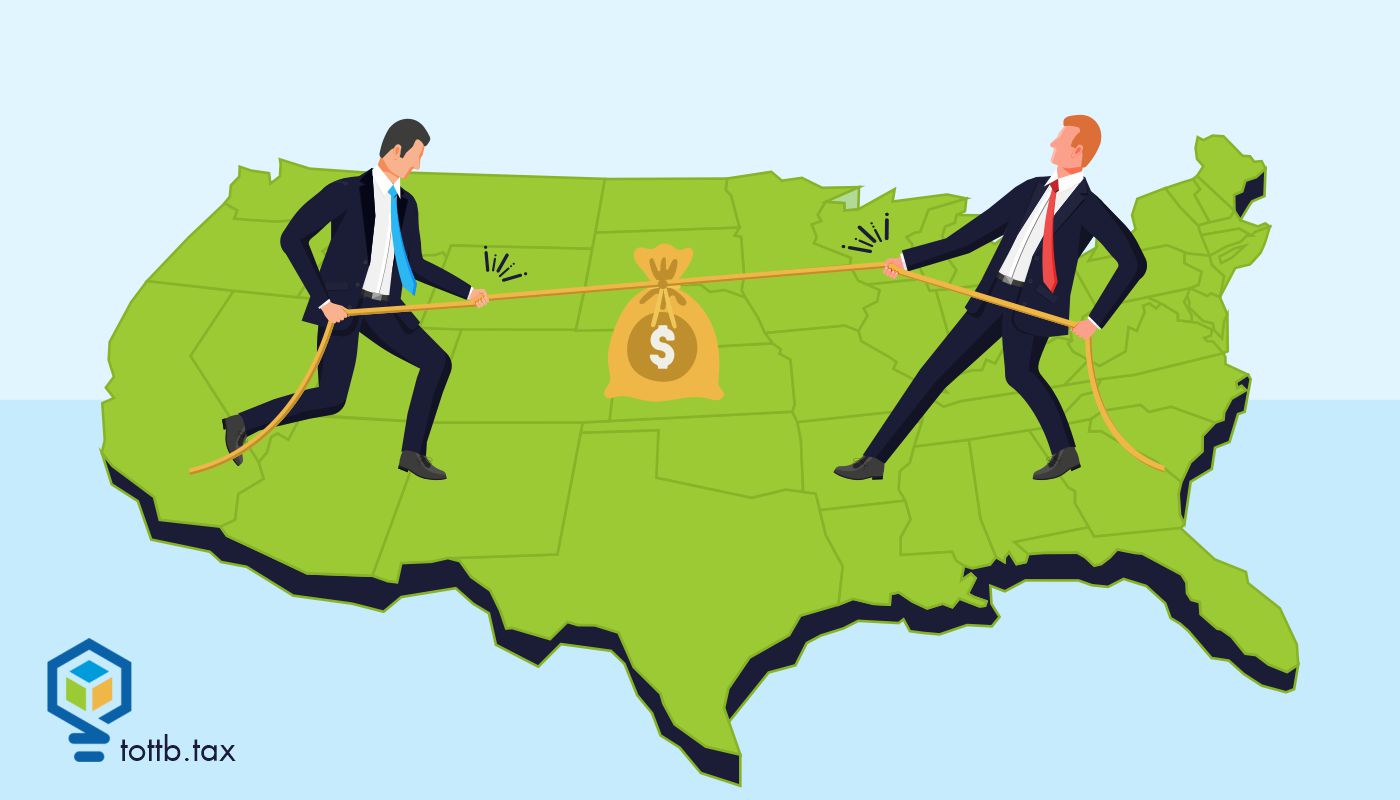
At Around the Tax World, you can find out all about what’s going on in the wonderful, worldwide world of tax. Every month, we’ll feature a few mini-articles on what’s been going on in the world when it comes to tax, and fully available for viewing even if you don’t have a subscription.
If you wish to subscribe and gain access to all articles on the site, be sure to check out the benefits of doing so here!
Check out what’s happening all around the world of tax!
In The Headlines
- New A.I. safety laws will impact the majority of top A.I. companies. California Governor Gavin Newsom recently signed the Transparency in Frontier Artificial Intelligence Act, which requires A.I. companies to meet transparency requirements and report safety-related incidents. Though several states have begun regulating other aspects of A.I., California’s safety-focused laws are the first of its kind in the U.S. This is especially significant because 32 of the world’s top 50 A.I. companies are based in the Golden State. The new law requires A.I. companies document their safety practices and publish this information publicly. Severe safety incidents must be reported to California’s Office of Emergency Services. Some A.I. leaders endorsed the bill, but many expressed a preference for federal legislation, since differences in state legislation could make compliance difficult in the future. This request might be answered by the newly-proposed Artificial Intelligence Risk Evaluation Act, a federal bill that would focus on mitigating the risks of advanced A.I.
- Electric vehicle sales exploded right before a federal tax credit expired. The passage of the “One Big Beautiful Bill Act” cemented the end of the clean vehicle tax credit, which offered eligible taxpayers $7,500 for the purchase of a new EV and $4,000 for a used EV. Vehicles purchased after September 30, 2025 are no longer eligible for the tax break. With the countdown clock ticking down, EV sales shot up by an estimated 21.1% compared to Q3 of last year. This also represents a 30% increase since Q2 of this year. In the month of August, EV sales composed 11% of the U.S. market—a similar level to December 2024 when buyers rushed to secure the EV tax credit before President Trump entered the White House. What comes next for the auto industry? Researchers are anticipating that the end of the EV tax credit, combined with new emissions rules and tariffs, will reduce sales by 16% to 38% in Q4 and beyond.
- Next up in the U.S. government’s investment strategy: lithium mines. Based in northern Nevada, Lithium Americas has just gained a new investor, namely the federal government. The company is currently developing one of the world’s largest lithium mines, potentially allowing the U.S. to lessen its reliance on China for critical minerals to produce high-tech cell phone and electric vehicle batteries. The U.S. Department of Energy will take a 5% equity stake in Lithium Americas along with a 5% stake in the Thacker Pass lithium mining project. This mine is expected to hold enough lithium to build 1 million electric vehicles each year. Between the U.S. and Canada, the mining company will receive a loan of about $2.3 billion. After this announcement was made, Lithium Americas stock increased by more than 35%.
What's New In The Tax World?
A failed deal over ACA premium tax credits gives way to a government shutdown
After a Republican-backed stopgap funding bill was axed by the Senate, the U.S. federal government has ceased operations. Though some federal agencies have enough funds to continue working for now, others are now forced to furlough their workers until a new spending plan is in place. At the center of the stalemate is a decision on the enhanced premium tax credit. An estimated 22 million Americans are eligible for this tax credit and use it to lower the cost of purchasing health insurance through the Affordable Care Act’s marketplaces.
The enhanced premium tax credit was introduced by the American Rescue Plan Act in 2021. Since then, ACA marketplace health plan enrollment has almost doubled. However, the tax credit is currently set to expire at the end of this year, resulting in heated debate between Republican and Democratic lawmakers. The tax credit is intended for Americans who do not qualify for Medicaid but who do not have access to affordable health insurance through an employer. To qualify, your annual earnings must fall between 100% to 400% of the national poverty level.
What will the aftermath look like if the premium tax credit does expire? Without this subsidy, ACA premiums could more than double according to an analysis by KFF. This means that the average cost could rise from $888 in 2025 to $1,904 in 2026. Some policy holders have already received notices from their health insurance providers that premiums will rise next year, as much as 50% in some states. A recent poll found that 312 insurers participating in ACA marketplaces are considering a 18% increase to their premiums for 2026. The Congressional Budget Office estimates that about 4 million Americans would drop their coverage because they would no longer be able to afford it.
So what’s next for lawmakers? A new short-term funding bill will need 60 votes to pass in the Senate. At present, there are 53 Republicans and 47 Democrats in the Senate, meaning a passing vote will require bipartisan support. The failed stopgap bill was passed by the House, which is set to reconvene this week and continue seeking a resolution to the shutdown.
State-By-State Updates
- Michigan debates a 24% increase to its marijuana wholesale tax. As the state looks for funds to tackle road repairs, a proposed revenue-raiser would target the cannabis industry. The new provision would introduce a 24% wholesale tax on products sold at dispensaries. Opponents to the tax fear the tax would curb the industry’s growth and result in job losses. Since recreational marijuana was legalized in 2020, related taxes have generated almost $2 billion for the state. As lawmakers work on the state budget plan, several options have been floated to cover roadwork including pulling funds from schools, which garnered fierce opposition. Now advocates from the cannabis industry are rallying to protest the proposed tax, pointing to the benefits the state has already seen from marijuana businesses including half a million dollars toward emergency services and other amenities.
- Washington advertisers are getting hit with a new sales tax on services. Starting this October, over 90,000 businesses will face the state’s retail sales tax including advertising, information technology, live presentations, security, and temporary staffing services (except for those used by hospitals). The tax has already been contested as unconstitutional by telecommunications giant Comcast, which filed a lawsuit to have the tax on advertising services overturned. The advertising tax alone is set to raise $475 million in revenue over the next four years. If the tax is blocked, this would affect Washington’s ability to cover a shortfall in its operating budget. A number of other tax provisions were introduced under the same bill. Emerging nicotine products, like Zyn pouches, will see the same levy starting on January 1st, 2026. Service businesses will also see a higher business and occupation tax next year: those earning over $1 million will face a 1.75% levy, and those earning over $5 million will owe a 2.1% tax.
- West Virginia considers nixing state income tax on tips and overtime pay. State Treasurer Larry Pack is advocating to take a leaf out of the federal playbook and eliminate tax on tips and overtime pay. President Trump’s “One Big Beautiful Bill” contains these same tax provisions, and now West Virginia will weigh a proposal to do the same. Under the federal law, workers in industries that typically receive tips can deduct up to $25,000 in tips from their taxable income. Workers who receive overtime pay can also deduct up to $12,500 for the “half” portion of their “time and a half” wages. However, the nonpartisan Tax Policy Center estimates that only 3% of households will benefit from the “no tax on tips” policy. Opponents of the tax cut for West Virginia have voiced the same concern—that not enough taxpayers will benefit and that the cut only benefits employers who will feel justified in lowering their base wages.
- Wisconsin nixes its sales tax on household energy bills. As of October 2025, residents of the Badger State will pay less on their utility bills. Electricity and natural gas bills for permanent residences will now be tax-exempt year-round. Businesses are not included in this tax break. Wisconsin’s electric rates have more than doubled over the last decade, and three major local utilities companies have applied for rate increases in 2026 and 2027. State lawmakers had already approved a sales tax exemption from November through April each year, but for the remainder of the year, the 5% sales tax rate still applied. The tax cut is expected to save Wisconsinites an estimated $178 million over the next two years. This provision only lasts through 2027 and is part of a bipartisan $111 billion state budget signed this summer.
Tax Planning Tips
Trump throws his weight behind Hollywood with a new 100% tariff on foreign-made films
America has traditionally dominated the movie-making business. In movie theaters across the U.S., domestically-produced films overwhelmingly own the market. Abroad, American films earned $22.6 billion in exports and $15.3 billion in trade surplus in 2023. This made President Trump’s recent move a surprise to many analysts: the introduction of a tax on foreign films. The president explained this new tariff as a way to protect the American film industry and address national security concerns.
Details on how these tariffs would operate have yet to be defined. In this digital age, movies and TV shows are often streamed online rather than going through physical ports like tangible goods. The president also has not clarified whether American production companies filming in foreign locations would face a levy. Opponents of this proposal argue that the U.S. has more to lose if other countries retaliate with levies on American movies or entertainment services. The international market made up 70% of Hollywood’s box office revenue in 2024.
The IRS has ended its paper tax refunds—here’s what to expect
As of September 30th, 2025, the IRS will no longer issue paper tax refunds, according to a recent news release. In keeping with an executive order signed by President Trump in March, the agency will now only use electronic payments. The Social Security Administration will also begin phasing out paper benefit payments that same day. The reason? The IRS says paper checks increase the risk of fraud, theft, damage, or delay. Electronic payments are also expected to reduce costs and increase efficiency in issuing refunds. While paper payments take about six weeks to arrive by mail, electronic payments can typically be completed in less than 21 days. Taxpayers will simply need to provide information on a valid bank account.
For now, the switch to electronic-only just applies to refunds, not to taxpayer’s payments. Taxpayers can still pay taxes owed via check, money order, or cashier’s check, though electronic payments are highly preferred. Aside from the lack of literal paperwork, no other changes to the tax return filing process have been announced.
NOT A MEMBER YET?

SUBSCRIBE TO GET ALL OF OUR
GREAT ARTICLES AND RESOURCES!
CURRENT EDITION

Contracts, Signing Bonuses, and the Substantial Presence Test
In tighter job markets, recruits are often offered signing bonuses (and sometimes moving expenses) to join a firm. Sometimes construction workers temporarily relocate to jobs in other states while they are employed by the company that hired them in their home state. This article reviews some of the foundational tax concepts to consider when evaluating sourcing of income for state tax purposes.

Help Clients Rebuild Tax Records After Disaster
Tax pros help clients with a lot of catastrophes: wrangles with tax authorities, paltry nest eggs, more wrangles with tax authorities. More frequently, your clients might face a more tangible and cinematic disaster. These days, there’s always a storm comin’. Swept away in that destruction, for many people, are physical tax and financial records. A few precautions could have prevented such loss and made life at least a bit easier for victims. Here’s how to help clients head off trouble – and recover after it hits.

George M. Cohan’s Tax Triumph: The Rise and Erosion of the Cohan Rule
The Cohan rule is named for George M. Cohan. George Michael Cohan (1878 – 1942) was a theatrical producer. In the decade before World War I, he was called the “man who owned Broadway” and is considered the father of American musical comedy. In 1940 he was awarded the Congressional Gold Medal for his contribution to morale during World War I with his songs “You’re a Grand Old Flag” and “Over There,” the first time the medal was awarded to someone in an artistic field. But his most enduring legacy may be the tax rule that shared its name.

